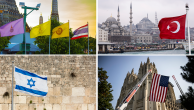Israeli Jews all but universally say anti-Semitism is at least somewhat common around the world today, including nearly two-thirds who say it is very common. And roughly three-quarters say anti-Semitism is not only common but on the rise globally, while virtually no Israeli Jews say it is decreasing. Majorities of Jews across different groups have similar perspectives on these questions.
Relatively few Jews, however, see evidence of widespread discrimination in their own society based on gender, religion, ethnicity or sexual orientation. About one-in-five Israeli Jews say there is a lot of discrimination against Muslims in their society, while a quarter say there is evidence of widespread discrimination against women. A somewhat larger share (36%) say there is a lot of discrimination against Ethiopian Jews.
Arabs describe far more discrimination in Israeli society than do Jews. The vast majority of Arabs say there is a lot of discrimination against Muslims in Israel. Arabs also are more likely than Jews to say they see discrimination against many other groups, including women, Ethiopian Jews and gays and lesbians.
When it comes to the experiences of religious minorities in Israel, Muslims are more likely than Christians or Druze to say they have faced discrimination because of their religious identity. Fully 37% of Muslims say that, in the past 12 months, they have faced at least one of four difficult situations mentioned in the survey – being prevented from traveling between work and home, being stopped and questioned by security forces, being physically beaten or attacked or experiencing damage to their home or property – because of their religion.
Yet about a quarter of Israeli Muslims also say that in the past year a Jewish person has expressed concern or sympathy toward them because of their religion.
Majority of Jews say anti-Semitism is very common around the world
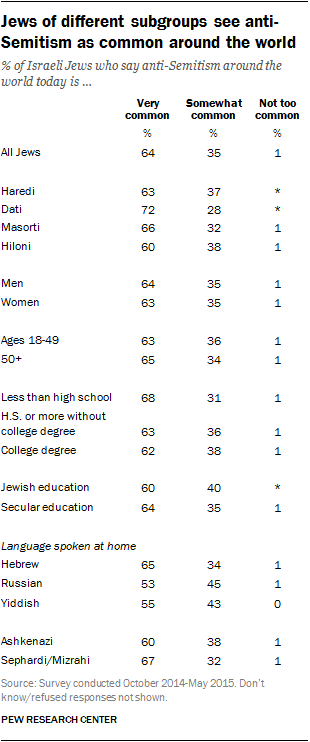
Nearly all Israeli Jews included in this survey say anti-Semitism is very common (64%) or somewhat common (35%) around the world today. Very few say anti-Semitism is not too common.
Hilonim are somewhat less likely (60%) than Datiim (72%) and Masortim (66%) to say anti-Semitism is very common around the world, but views on anti-Semitism are largely similar across different Jewish demographic groups. Roughly six-in-ten or more men and women, older and younger Israeli Jews, and Jews with varying levels of education say anti-Semitism is very common globally.
The survey also asked respondents whether anti-Semitism is increasing or decreasing around the world today.
Roughly three-in-four Israeli Jews (76%) say not only is anti-Semitism common around the world, but it is increasing. Very few (1%) say anti-Semitism is on the wane. About one-in-five (22%) say anti-Semitism is common but steady (or do not take a position on trends in anti-Semitism).
Substantial majorities of Haredim (79%), Datiim (79%), Masortim (75%) and Hilonim (75%) say anti-Semitism is already widespread and becoming even more common. There also are no significant differences in the opinions of Jews of different ages and educational backgrounds when it comes to whether anti-Semitism is increasing.
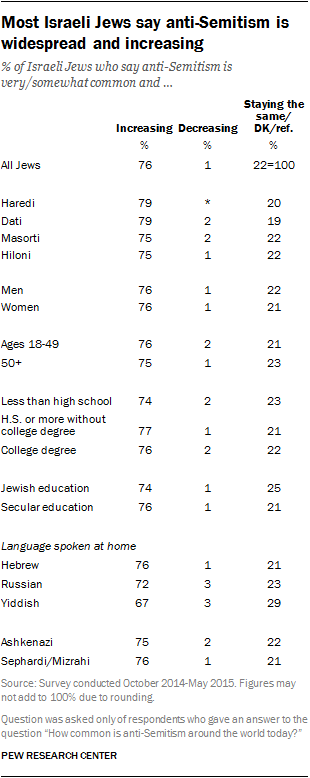
Roughly one-third of Jews say Ethiopian Jews face a lot of discrimination in Israel
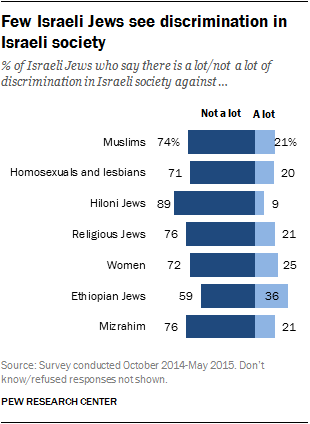
Most Israeli Jews do not see evidence of widespread discrimination against a number of groups in their society. For example, 21% of Israeli Jews say that in their society there is a lot of discrimination against Muslims, while about three-quarters (74%) say there is not a lot of discrimination against Muslims in Israel.
Similarly, 25% of Israeli Jews say there is a lot of discrimination against women in their society, while 72% say there is not.
Somewhat more Jews (36%) see Ethiopian Jews as facing a lot of discrimination in Israeli society, but most Israeli Jews (59%) say there is not a lot of discrimination against Ethiopian Jews.
Hilonim are somewhat more likely than Haredim to see a lot of discrimination against Muslims in their society (25% vs. 13%).
Haredim also are less likely to see discrimination against some other groups. For instance, 7% of Haredim say there is a lot of discrimination against gay men and lesbians in Israel, compared with roughly one-in-five who say this among Datiim, Masortim and Hilonim. Similarly, 13% of Haredim say there is a lot of discrimination against women, compared with about a quarter who say the same among all other Jewish subgroups.
Overall, women are about twice as likely as men to say there is a lot of discrimination against women in Israeli society today (34% vs. 16%).
Most Haredim (64%) and four-in-ten Datiim say there is a lot of discrimination against religious Jews in Israeli society, far greater than the shares of Masortim (20%) and Hilonim (9%) who say the same. Hilonim are somewhat more likely than Haredim to see discrimination against their own group in Israeli society (10% vs. 4%).
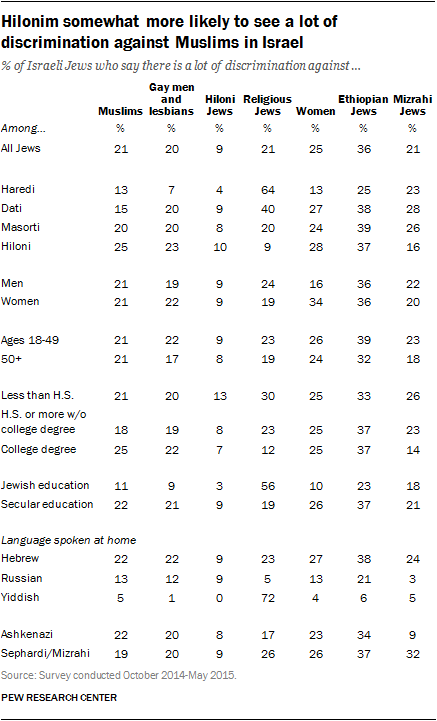
The survey also asked Arabs whether there is a lot of discrimination against these various groups in Israeli society.
Arabs are considerably more likely than Jews to see discrimination in Israeli society against nearly all of these groups. For example, 79% of Arabs say there is a lot of discrimination against Muslims in Israeli society, compared with 21% of Jews who say this. Arabs also are more likely than Jews to see discrimination against gays and lesbians (34% vs. 20%), women (40% vs. 25%) and even some Jewish groups, such as Hiloni Jews (21% vs. 9%) and Mizrahi Jews of Middle Eastern and North African descent (33% vs. 21%).

More Muslims (83%) than Christians (57%) and Druze (53%) say there is a lot of discrimination against Muslims in Israel. Muslims are also considerably more likely (42%) than Druze (27%) to say there is discrimination against women in the country. Otherwise, there are at most modest differences among Israel’s religious minorities on these questions.
Younger Muslims are more likely than their elders to see a lot of discrimination in Israeli society. For instance, 37% of Muslims ages 18 to 49 see a lot of discrimination against gay men and lesbians in their society, compared with 20% among Muslims ages 50 and older.
About a quarter of Muslims say a Jewish person has expressed sympathy recently
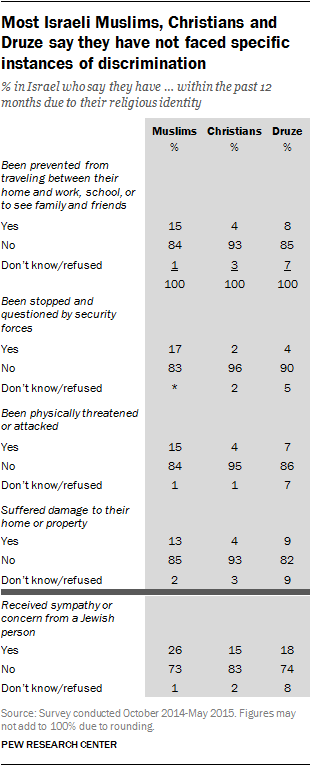
The survey asked Muslim, Christian and Druze respondents about difficult experiences or harassment they may have faced because of their religious identity within the past year.34
Overall, Muslims are more likely than Christians or Druze to say they have faced these forms of discrimination recently. About one-in-six Muslims say they have faced travel restrictions (15%), been questioned by security forces (17%) or faced physical threats or attacks (15%). And 13% say they have suffered property damage within the past year because of their religious identity.
On the other hand, about a quarter of Israeli Muslims (26%) say a Jewish person expressed concern or sympathy toward them in the past year due to their religious identity. Somewhat smaller shares of Israeli Christians (15%) and Druze (18%) say a Jewish person has expressed sympathy toward them in the past 12 months.
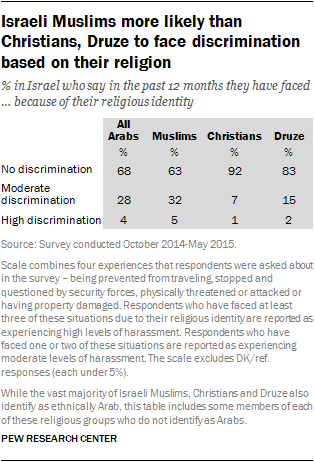
Combining all four of these specific types of discrimination or harassment into a scale provides a sense of how common these experiences are in Israel.
While relatively few Muslims, Christians and Druze say they have faced high levels of discrimination – that is, they have experienced at least three of the four situations mentioned in the survey in the past 12 months – about three-in-ten Muslims (32%) say they have faced one or two of these situations. Muslims are more likely than Christians (7%) or Druze (15%) to say they have experienced one or two types of discrimination in the past year.
Muslim men are somewhat more likely than Muslim women to say they have experienced at least one specific type of discrimination in the past 12 months.
